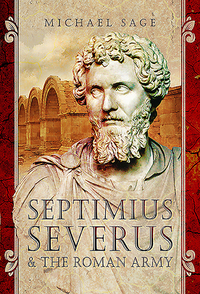Take a photo of a barcode or cover
bibliomania_express's review
3.0
Septimius Severus and the Roman Army examines the rise of Septimius Severus to emperor at the end of the second century AD, the civil wars, the issue of succession, and his relationship with the military. I appreciated that there was a chapter at the beginning examining the usefulness of the primary literary sources. I did, however, find that Sage had an annoying habit of recounting episodes from these sources as if they are fact, and then stating that they were likely overblown, made up, or at least unable to be confirmed.
I also found that there were many rather long tangents, such as one into the banditry of Bulla Felix, which was very interesting but had little to add to the focus of the book. In fact, while Sage touches on potential proto-racism based on Severus's origins in Africa, describes the relationship between Africa and its legions and the empire as a whole, and breaks down the major campaigns that won Severus the throne, it is only the last chapter where we learn about the concrete changes under Severus that changed the lives of soldiers in the Roman army. It is also where we get the best description of how the Roman army functioned, the rising presence of equestrian status commanders, and the functional power of the army. This is what I wanted out of this book, so I was a bit disappointed to have it all crammed within perhaps 12 pages.
The other chapters were a thorough recounting of Severus's life, the political climate, the tensions on the borders of the empire, and the very problematic role of the Praetorian Guard in the assassination of emperors and crowning of their successors. It just read more like a biography rather than an examination of the army in particular.
Overall, this book was informative and did take the time to interrogate its primary sources throughout the chapters. There's less explicit engagement with secondary sources than I would expect, and I felt like the book didn't spend enough time on the army and instead focused on the political machinations in the imperial household.
Rating: 3 stars
*Thank you to #NetGalley and the publisher for a free eARC in exchange for an honest review.
I also found that there were many rather long tangents, such as one into the banditry of Bulla Felix, which was very interesting but had little to add to the focus of the book. In fact, while Sage touches on potential proto-racism based on Severus's origins in Africa, describes the relationship between Africa and its legions and the empire as a whole, and breaks down the major campaigns that won Severus the throne, it is only the last chapter where we learn about the concrete changes under Severus that changed the lives of soldiers in the Roman army. It is also where we get the best description of how the Roman army functioned, the rising presence of equestrian status commanders, and the functional power of the army. This is what I wanted out of this book, so I was a bit disappointed to have it all crammed within perhaps 12 pages.
The other chapters were a thorough recounting of Severus's life, the political climate, the tensions on the borders of the empire, and the very problematic role of the Praetorian Guard in the assassination of emperors and crowning of their successors. It just read more like a biography rather than an examination of the army in particular.
Overall, this book was informative and did take the time to interrogate its primary sources throughout the chapters. There's less explicit engagement with secondary sources than I would expect, and I felt like the book didn't spend enough time on the army and instead focused on the political machinations in the imperial household.
Rating: 3 stars
*Thank you to #NetGalley and the publisher for a free eARC in exchange for an honest review.
